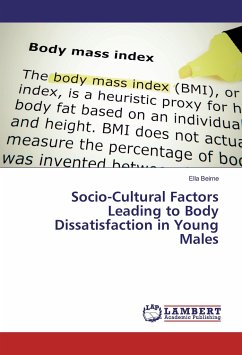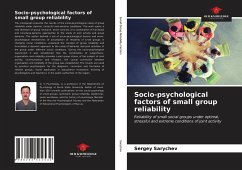
Socio-Cultural Factors Leading to Body Dissatisfaction in Young Males
Versandkostenfrei!
Versandfertig in 6-10 Tagen
33,99 €
inkl. MwSt.

PAYBACK Punkte
17 °P sammeln!
This quantitative research examined the levels of body dissatisfaction in males aged between 16 and 25 in the United Kingdom, and the role their relationships, engagement with the media and subjection to Body Mass Index (BMI) scales played in its development. It also examined implications of this relationship through a hegemonic masculine lens. Whilst the sample is not representative, this paper indicates that body dissatisfaction is likely a much more shared gender concern than once thought, and that hegemonic masculinity is not just perpetuated through the media and through overtly powerful ...
This quantitative research examined the levels of body dissatisfaction in males aged between 16 and 25 in the United Kingdom, and the role their relationships, engagement with the media and subjection to Body Mass Index (BMI) scales played in its development. It also examined implications of this relationship through a hegemonic masculine lens. Whilst the sample is not representative, this paper indicates that body dissatisfaction is likely a much more shared gender concern than once thought, and that hegemonic masculinity is not just perpetuated through the media and through overtly powerful sites, but that the micro-level interactions in the context of family, peers, school as well as health discourses, are also important. This book provides further evidence into the discussion of hegemonic masculinities by evidencing the subtle reproduction of embodied hegemonic masculinities through both overt platforms such as the media, and among micro interactions such as among peers.












